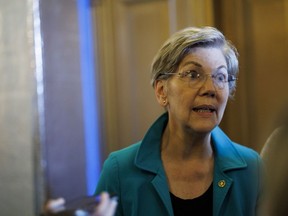(Bloomberg) — Sign up for the New Economy Daily newsletter, follow us @economics and subscribe to our podcast.

Article content
(Bloomberg) — Sign up for the New Economy Daily newsletter, follow us @economics and subscribe to our podcast.
Article content
Senator Elizabeth Warren took aim at the Federal Reserve’s inflation-fighting game plan on Sunday, saying she was worried the central bank will tip the US economy into a recession.
Article content
“Do you know what’s worse than high prices and a strong economy?” the Massachusetts Democrat asked on CNN’s “State of the Union.” “It’s high prices and millions of people out of work. I’m very worried that the Fed is going to tip the economy into recession.”
Warren renewed her criticism of Fed Chair Jerome Powell’s monetary tightening policies, saying she doesn’t believe increasing interest rates can contain current inflationary pressures.
“Things like the fact that Covid is still shutting down parts of the economy around the world, that we still have supply chain kinks, that we still have a war going on in Ukraine that drives up the cost of energy,” Warren said. “There is nothing in raising interest rates, nothing in Jerome Powell’s toolbag, that deals directly with those.”
Article content
Powell, in a highly anticipated speech from Jackson Hole, Wyoming, on Friday, signaled the Fed was going to continue its aggressive series of interest rate hikes, and keep rates elevated for a time, to try to tamp down demand and get inflation under control. He warned of slowing growth and “some pain” to households and businesses to get there.
Warren said his comments indicate that jobs will be lost and small businesses hurt.
Fed officials and their European counterparts, also dealing with decades-high inflation, are pushing back against suggestions they will reverse course if their economies falter while price pressures remain too high.
Atlanta Fed President Raphael Bostic told Bloomberg Television last week the economy has to weaken first before inflation starts to move down, and that such a shift would typically require the Fed to hold rates at higher levels for 18 months to two years.
An analysis by the Federal Reserve Bank of New York found that a majority of US pandemic-era inflation came from a surge in demand and a move away from services to goods, but supply-chain constraints such as worker shortages and logistics bottlenecks stoked it further.
Stay connected with us on social media platform for instant update click here to join our Twitter, & Facebook
We are now on Telegram. Click here to join our channel (@TechiUpdate) and stay updated with the latest Technology headlines.
For all the latest Business News Click Here
For the latest news and updates, follow us on Google News.
